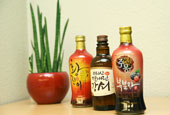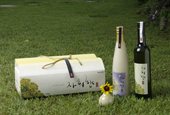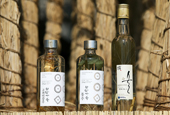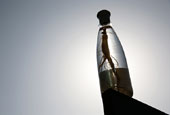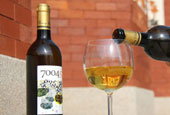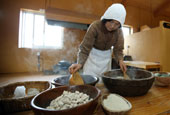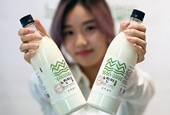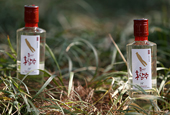Haejang in Korean (해장, 解酲) means relief from the hangover caused by heavy drinking the previous day. The following morning after a serious drinking session, many people try to recover from their hangover by eating various kinds of food. Many Koreans prefer a hot soup, or a haejangguk. One of the most popular haejangguk dishes is kongnamul haejangguk made from bean sprouts and various other vegetables. This is because bean sprouts contain a lot of aspartic acid, a type of amino acid that has an alcoholysis effect.
Jeonju, the capital of Jeollabuk-do (North Jeolla Province), is known for its bean sprout haejangguk, as well as for the more famous Jeonju bibimbap. In this city, many people enjoy the hot morning soup with a special beverage, moju. A glass of moju can have the fragrant aroma of cinnamon, ginger and other Oriental medicinal ingredients. It has a soft and mild taste, with a slight sweetness, leaving a wonderful finish in the mouth. It is fresh and thick, like a freshly pressed glass of organic fruit juice.
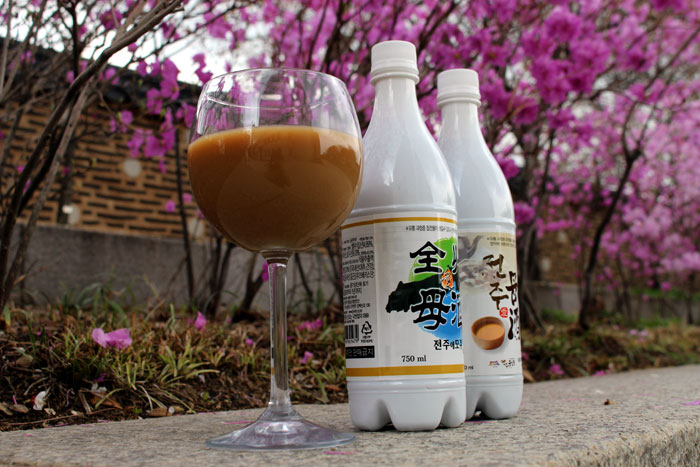
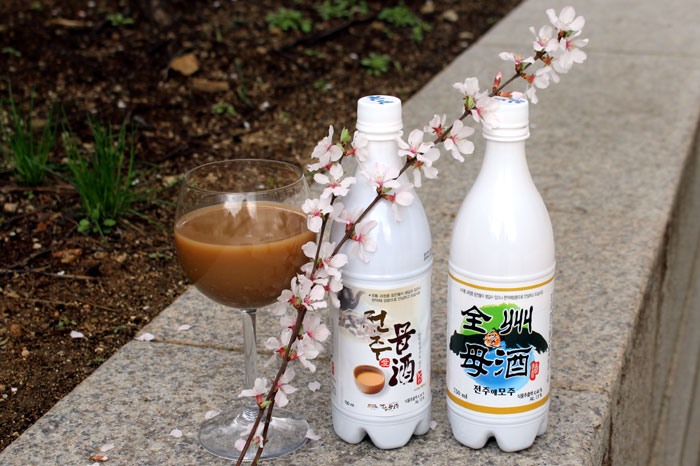
Moju, a local beverage from Jeonju, actually means, "liquor made by the mother of the queen consort." This is according to the "Daedong Yaseung" (대동야승, 大東野乘), an unofficial collection of histories, anecdotes and essays compiled during the reign of King Injo (1595-1649). Based on the book, the mother of Inmok Daebi (1584-1632), the queen consort, made handmade liquor by reusing the rice alcoholic beverage grain from making makgeoli and sold it to local residents at a cheap price when she was exiled to Jeju Island. For this reason, people initially called the liquor daebi moju, which was later shortened to moju. The “mo” (모, 母) means, "mother," and the “ju” (주, 酒) means, "alcoholic beverage."
Moju is made from various Oriental medicinal ingredients, including cinnamon, ginger, jujubes, ginseng, kudzu, roots of arrowroot, fruit and makgeoli. Thanks to the medicinal ingredients, it is known as a healthy drink, helping to prevent colds, especially in the winter. All the ingredients are mixed and boiled for about 24 hours, which causes most of the alcohol to evaporate. So everyone can enjoy this drink because it contains a low level of alcohol, about 1.5 percent. It goes well with any kind of ordinary Korean meal, such as hot soups and rice. These days, moju is even used to create more varied food items, like ice creams.
Thanks to its recent commercialization, moju is sold not only in Jeonju but also in other parts of the country, including Seoul and across Gyeonggi-do (Gyeonggi Province). Among them include moju varieties such as Jeonju Moju, Jeonjuae Moju and Cheonnyeonae Moju, all made by Namwon-based local brewer Cheonnyeon Juga. These products can be found throughout the brewer’s distribution channels at several franchise restaurants throughout the country. Anyone can enjoy the medicinal efficacy and the rich flavor of Oriental medicine by simply sipping a glass of moju.
By Yoon Sojung
Photos: Wi Tack-whan
Korea.net Staff Writers
arete@korea.kr
For more information, please call +82-80-635-0168 or visit http://www.jherb.co.kr the brewer's homepage.
Jeonju, the capital of Jeollabuk-do (North Jeolla Province), is known for its bean sprout haejangguk, as well as for the more famous Jeonju bibimbap. In this city, many people enjoy the hot morning soup with a special beverage, moju. A glass of moju can have the fragrant aroma of cinnamon, ginger and other Oriental medicinal ingredients. It has a soft and mild taste, with a slight sweetness, leaving a wonderful finish in the mouth. It is fresh and thick, like a freshly pressed glass of organic fruit juice.


Moju is made from a range of Oriental medicines and makgeoli, traditional Korean rice beer. To make the drink, all ingredients are mixed together and brought to a boil for many hours. It is good for preventing colds, especially in the winter. The above photos are of Jeonju moju from the Cheonnyeon Juga brewery.
Moju, a local beverage from Jeonju, actually means, "liquor made by the mother of the queen consort." This is according to the "Daedong Yaseung" (대동야승, 大東野乘), an unofficial collection of histories, anecdotes and essays compiled during the reign of King Injo (1595-1649). Based on the book, the mother of Inmok Daebi (1584-1632), the queen consort, made handmade liquor by reusing the rice alcoholic beverage grain from making makgeoli and sold it to local residents at a cheap price when she was exiled to Jeju Island. For this reason, people initially called the liquor daebi moju, which was later shortened to moju. The “mo” (모, 母) means, "mother," and the “ju” (주, 酒) means, "alcoholic beverage."
Moju is made from various Oriental medicinal ingredients, including cinnamon, ginger, jujubes, ginseng, kudzu, roots of arrowroot, fruit and makgeoli. Thanks to the medicinal ingredients, it is known as a healthy drink, helping to prevent colds, especially in the winter. All the ingredients are mixed and boiled for about 24 hours, which causes most of the alcohol to evaporate. So everyone can enjoy this drink because it contains a low level of alcohol, about 1.5 percent. It goes well with any kind of ordinary Korean meal, such as hot soups and rice. These days, moju is even used to create more varied food items, like ice creams.
Thanks to its recent commercialization, moju is sold not only in Jeonju but also in other parts of the country, including Seoul and across Gyeonggi-do (Gyeonggi Province). Among them include moju varieties such as Jeonju Moju, Jeonjuae Moju and Cheonnyeonae Moju, all made by Namwon-based local brewer Cheonnyeon Juga. These products can be found throughout the brewer’s distribution channels at several franchise restaurants throughout the country. Anyone can enjoy the medicinal efficacy and the rich flavor of Oriental medicine by simply sipping a glass of moju.
By Yoon Sojung
Photos: Wi Tack-whan
Korea.net Staff Writers
arete@korea.kr
For more information, please call +82-80-635-0168 or visit http://www.jherb.co.kr the brewer's homepage.
